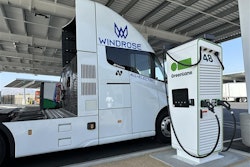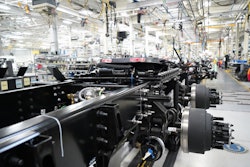Can you trust big truck makers to keep their word? It sure doesn’t look like it, as four giant truck makers have charged to court to try to get out of a deal they themselves shook hands on just a few years ago
In an era of political whiplash, the Clean Truck Partnership (CTP), which I helped to negotiate, was meant to be a stabilizing force. It is a voluntary agreement between regulators and major truck makers to chart a stable path toward zero-emission vehicles, and it offers investment certainty for businesses. But now, that deal is under threat from the very companies that helped shape it.
The lawsuit taken by Daimler Truck of North America, Volvo Group, International and Paccar against the California Air Resources Board is an audacious move given what these truck manufacturers said about the agreement when they signed it just two years ago. Daimler stated “the key to success is a close collaboration” under the agreement, Volvo said it was “the foundation for our customers to have the greatest possible product availability consistent with California’s climate change and air quality goals, while Paccar said the “agreement provides regulatory certainty” and would ensure a “continued supply of product”.
So much for certainty, collaboration, and product for customers. The lawsuit now claims the companies are “unable to plan with the necessary certainty and clarity”, bizarrely, because they are being held to the deal they trumpeted. You can’t make this stuff up.
This legal move serves as the sobering reply to a letter from 18 business, public health and environment groups sent to manufacturers to honor the commitments they signed up to.
Certainty when we need it most
The trucking industry should care about this U-turn by truck manufacturers. At a time when the industry faces instability, manufacturers should be reinforcing confidence, not burning it down.
Instead, dominant players like Daimler, which controls 40% of the U.S. truck market, are badly letting the trucking industry down: it is cutting jobs and doubling down on high cost diesel. While China is ramping up electric truck adoption, manufacturers are giving customers no choice but to remain locked into increasing gas prices.
We must acknowledge the role truck manufacturers played in whipping up concerns among the trucking industry about the regulations aimed at increasing cleaner trucks and getting the industry off high diesel prices. Truck makers stirred up fear over clean truck rules, falsely claiming they ban diesel and force fleets to buy electric trucks – claims debunked by regulators. The real goal in my view? Shift costs onto the industry while securing a loophole to keep selling polluting diesels.
Now, with rollbacks underway, manufacturers have scored a pyrrhic victory: fewer rules for them, higher costs for fleets, and stalled innovation that will set back the manufacturers in the medium term – along with stranding the U.S. freight system in high-cost diesel as our rivals electrify. If they blow up their own deal, all that only gets worse.
None of this should shock fleets which have been on the receiving end of truck manufacturers’ disgraceful opaque truck pricing system. When it comes to electric trucks, the markups are clear and undermine the economies of scale that a well-functioning market would create: for some models, US buyers pay up to $94,000 more than in Europe.
We are in a critical moment. The Environmental Protection Agency is trying to do away with the Phase 3 greenhouse gas standards for trucks – rules meant to push manufacturers to finally deliver innovative and cleaner vehicles. Federal estimates show these standards were aiming to save fleet owners up to $10,500 per truck annually in fuel and maintenance costs.
All indicators show truck manufacturers are hurting too: Daimler’s Q2 results showed a 20% drop in sales and a 50% drop in orders while the CEO of Traton said said the proposed EPA rollbacks are causing “a lot of insecurity and actually frustration” for manufacturers, their dealers, and their customers, increasing market uncertainty and jeopardizing pre-buys.
What we need is a collective effort to address all of our issues, whether it's truck pricing, the health and future of the trucking industry, trucking innovation or air quality. But you can’t collaborate if your partners break their word.
What manufacturers do now will define the next decade of freight
The Clean Trucks Partnership offers an essential signal to businesses and fleets: zero-emission vehicles are not just coming – they are bankable, scalable, and supported by both industry and government. Fleets across the country are already adopting electric trucks. Over 52,000 are on the road today because they see the benefits: cleaner air, lower fuel and maintenance costs, and a way to future-proof their businesses. But they need to know that manufacturers won’t backpedal and will instead make the investments needed to make electric trucks affordable for all.
The Clean Trucks Partnership was never just symbolic. It was a signal of intent, a line in the sand. If the industry can’t uphold a deal they made voluntarily – one that clearly benefits their customers, workers, and long-term profitability by scaling electric trucks to 50% of sales by 2030 – why should anyone, including the California regulators overseeing the world’s fourth largest economy, believe their next promise? Truck makers who signed this agreement and are not plaintiffs to this lawsuit must make their intentions known by publicly reaffirming their commitment.
This is a moment of truth for the trucking industry. Manufacturers must decide: will they keep their word and lead the way toward a cleaner, more resilient future or retreat into delay, leaving us to pay the price?










